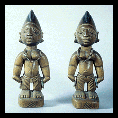|
|

 Beginnings. IBEJI began working with children in Pelourinho, part of Salvador's Historic District, in 1988. At that time, living conditions in this part of the city were extremely poor. Then, in 1991, the State of Bahia began a major restoration project that led to the original inhabitants of the community being evicted and moved out to the city's peripheral slums. Since then, there has been an increase in the number of children who spend most of their time living and working on the streets. The more time they spend there, the more they get drawn into street life and inevitably get involved with drug abuse and other illegal activities.
Off the streets. After working in the streets for nearly five years, IBEJI in March 1994 found a modest location in Salvador's city center. Our work was initially carried out there on a voluntary basis, aiming to channel the children's energy and aggression into art activities such as drama, singing, dance, painting, etc. We provided them with an adult reference point, liaised with their families, and helped return the children to their homes and schools whenever possible and appropriate. Shelter, food and skills.The project has developed to offer educational, medical and recreational facilities in a safe, secure environment away from the streets, providing primary education, three meals a day, protection and support for families. Now we are also working as a night shelter. The children all go to school, and are also involved in other activities such as sewing, art education and computer skills, which are designed to alleviate and if possible overcome the emotional disturbances caused by the children's previous lifestyle. The direct beneficiaries are children between the ages of 14 and 17. At present, the Project is working with approximately 35 clients, 17 of whom spend the night at IBEJI. Ten are now sleeping at home and spend their days at the project, as part of the process of rejoining their families. The wider beneficiaries are parents and guardians of these children as well as the community members involved in preventive and awareness-raising work in the communities. New home. IBEJI moved to its present address in 1996. An old house that has been declared a national treasure, it was soon repaired and has plenty of space for the children to play outside. IBEJI aims to respond to the needs of the population of children who have no access to existing services for street children and are "falling through the net." It is currently the only project in the city of Salvador that welcomes adolescents with a history of drug abuse and run-ins with the law. Since 2000, when the project was "redesigned," all the adolescents sheltered here have been referred by the Juvenile Authority. IBEJI is a non-governmental organization registered as a charity in
Salvador, Bahia, Brazil. The project's official charity status entitles
donors to make tax-deductible contributions. Until now, IBEJI has relied
solely on the generosity of private donors and the British government (DFID)
through Childhope. If you are interested in helping, all contributions
are welcome.
The charity's tax number is CGC 00.345.262/0001-98
For further information, please contact us: PROJETO IBEJI
Origins and meaning of IBEJI's name IBEJI means "twins" in Yoruba (an African language). Originally believed to protect their human counterparts, their blessing has been extended in Bahia to embrace all children. For more information, click on the image below. |

